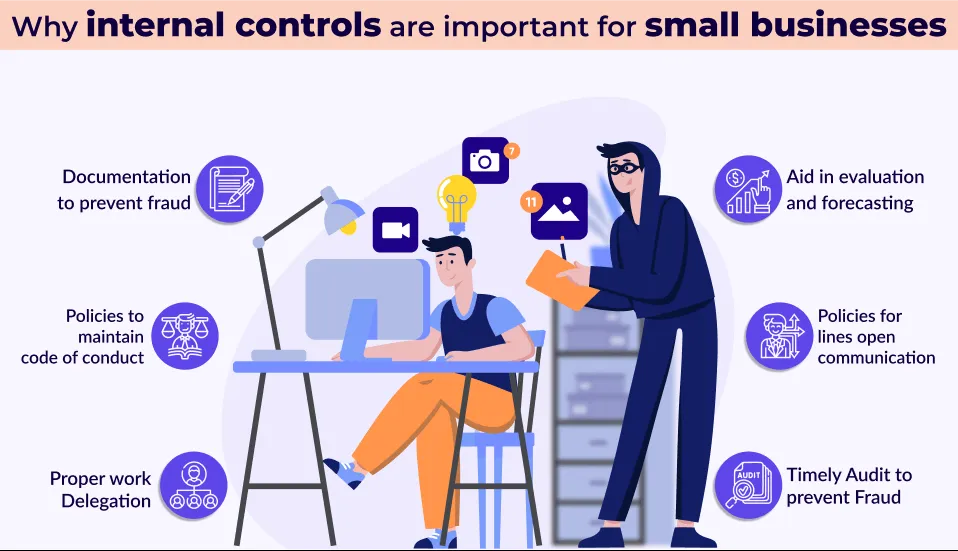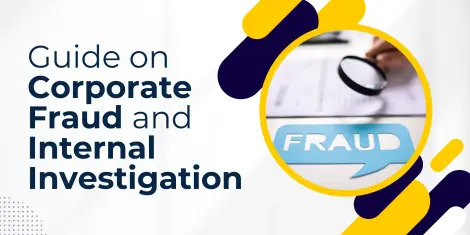Table of Contents
While running a business, one encounters tons of business operations and chases after multiple vital events and dates to grow and scale up the business. Being on top of all business operations and bringing in more opportunities is a must. Such actions proliferate, resulting in growth. However, some operations may go out of sight as a firm grows, resulting in significant losses. Internal Controls is the simple answer to it.
How to avoid such losses and save your company from fraudulent activities? Internal controls are the processes, regulations, and procedures that a firm puts in place to assure the accuracy of financial and accounting data, encourage accountability, and prevent fraud. Performing risk assessment and setting up internal controls can help your business become more efficient.
Internal controls are divided into three types, preventative and detective controls, and corrective internal controls.
Preventive control actions are designed to keep mistakes and fraud from occurring in the first place.
- Preventive control activities include
- Documentation
- Security
- Division of tasks
Detective controls take care of the fraud that the first line of defense misses. These include Reviews
- Reconciliation
- Financial reporting
- Financial statements
Corrective internal control rectifies the damage and puts things back in place.
- Revised policies
- Software patches
Internal controls help to keep all business operations in place through the prevention and detection of fraud. In this way, they construct a barrier around the company's business infrastructure, preventing it from being compromised.
Here's an overview of some crucial internal controls and their importance that will protect your small business from fraud and aids in fraud management.
Strict documentation to prevent fraud
Most entrepreneurs ignore process documentation, especially if their fledgling firm relies on staff who perform many duties. Documenting business processes is an essential aspect of business process management since it provides an overview of each stage of the process from start to finish to show how it operates.
Process documentation mitigates the risk of non-compliance and overlooks that each business operation is performed as per the policy. When processes are well-defined with supporting documents, you can track back to the documents and assess the job if any discrepancies are found in the future.
For instance, employee expense reports should be attached with necessary receipts, bills for reimbursement. This is not it; the report should be thoroughly examined by two supervisors and then approved.
Regulation of written policies to maintain code of conduct
Every business, big or small, has some policies and regulations which must be followed very carefully. While large companies make sure to regulate their policies, small businesses fall back on the same. Giving employees an orientation about the company policies is a good measure, but that is not enough. A document with all the policies stated clearly will remind the employees that the organization is vigilant and cares about policy obedience. When policies and procedures are presented in written form, employees are answerable for their actions.
Delegating work
The idea of 'Division of Work' refers to the practice of dividing a particular task or work into tiny bits or sections so that each part may be handled with great ease and efficiency. Strategically dividing the job among employees with different responsibilities and strata in the organization would ensure that there is no fraud or risk of discrepancy.
Assign a single assignment to several employees rather than a single task to a single employee.
For example, one accountant should draught a check, another should deposit the funds, and the management should sign the cheque.
Timely reviews and audits to prevent fraud
Checking up and reviewing the documentation indicates that you are on top of all the business operations, and every action is noted, good or bad. In most fraud cases, employees conduct questionable activities because they notice carefree behavior, often not reviewed by employees. Reviewing also benefits the company in many ways. It helps you prepare for any problem ahead of time as well as avoid it together.
Failure to implement such internal controls results in fraud and significant losses over time. This leads to a deterioration of reputation and the loss of commercial opportunities over time. Some frauds occur when there is a lack or absence of internal controls over accounting and transactions, while others occur when your company's data is not safeguarded and reviewed. Confidential data, which is a valuable asset to the firm, is hacked and released, resulting in losses and a case of fraud.
Small businesses and Fraud Risk.
According to the ACFE 2018 report on Fraud in Small Business, 29% of small businesses face risk due to Billing, 22% for check payment and tampering, 21% for expense reimbursements, 20% for skimming, and 16% for financial statement fraud. The data for such loss and risk is evidently less for large companies with 100+ employees.
Whereas the same data for the large companies for billing, check payment, tampering, expense reimbursement, skimming, and financial statement fraud is 18%, 8%, 11%, 8%, 7% respectively. The data for such loss and risk is evidently less for large companies with 100+ employees.
In addition to that, the ACFE report on Fraud in Small Business also states that small businesses have fewer anti-fraud controls than larger organizations, making them more susceptible to fraud.
In another report, report to the Nations 2020, the top 3 primary control weaknesses that contribute to occupational fraud are lack of Internal controls, Override of existing internal controls, and lack of management review.
Frauds due to Lack of Internal Controls and the Staggering loss!
The ACFE report on Fraud in Small Business states that the average loss to a small business due to occupational fraud is $200,000, out of which 42% is due to the fraud caused by a lack of internal controls.
Fraud prevention and protection through Internal Controls.
Internal controls act on two fronts to protect your organization from fraud: fraud detection and fraud prevention. Keeping internal controls up to date and tightly controlled allows you to maintain a careful eye on every business function, preventing fraud. While certain internal controls are responsible for detecting and correcting errors. Internal Controls handle both fraud detection and prevention in this manner.
NSKT global at your rescue!
NSKT Global understands the fraud risks for small businesses. We help small businesses reach their full operational potential by helping them to implement correct internal controls that will save them from staggering loss and fraudulent activities.
Still in a doubt? We are delighted to provide a free 20-minute business consultation. We want to dispel any doubts you may have and guide you towards a fraud-free business!
The session will center on providing you with specific suggestions to help your business thrive.
FREE 20 Mins CONSULTATION FOR UAE & Other COUNTRIES
FREE 20 Mins CONSULTATION FOR USA








